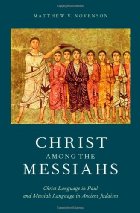 In the previous post we saw how Matthew Novenson in Christ among the Messiahs showed that
In the previous post we saw how Matthew Novenson in Christ among the Messiahs showed that
there were certain linguistic conventions in Jewish antiquity whereby a speaker or writer could refer meaningfully to the concept of a messiah by alluding to a small but significant group of scriptural texts.
This post looks at the question of discovering what word “messiah” itself meant, or what role a messiah was thought to have, among ancient authors and with special reference to Paul.
One approach to interpretation is to note the frequency with which the word is used. It is significant, says Novenson, that 1 and 2 Maccabees never use messiah language with reference to Judah Maccabee or his brothers, that the Epistle of James uses the word only twice (1:1 and 2:1) and the Gospel of Thomas not at all. Paul’s seven “undisputed” letters contain 270 instances of the word. This total is
more than he uses any other word for Jesus and more than any other ancient Jewish author uses that word. (p. 64)
So was Paul really “the most messianically interested of any ancient Jewish or Christian author”? Did he really mean “messiah” in any traditional Jewish sense or was it mainly a personal name he applied to Jesus?
.
The Name-versus-Title Debate
If Paul used the word Christ as a title for Jesus then we may understand Paul as having a messianic Christological view. If he used it only as a personal name, however, then we may conclude that he had no such Christology and the word had no particular or traditional messianic meaning.
Most scholars have come down on the side of the latter argument — that Paul uses Christ as a proper name,
and that consequently the messiahship of Jesus plays little or no role in Paul’s thought . . . It follows, then, that for Paul “the Christian message does not hinge, at least primarily, on the claim that Jesus was or is the Messiah.” In fact, for Paul, “the Messiahship of Jesus is simply not an issue.” (p. 65, quoting MacRae, also Hare, Kramer, Dahl)
A minority of scholars, including N. T. Wright, have taken the contrary view and argued that Paul used the term as a title and that the messiashship of Jesus “lies at the very heart of his theology, ecclesiology, and eschatology.” Continue reading “Christ among the Messiahs — Part 3a”
Like this:
Like Loading...

